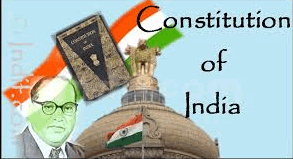Indian Constitution notes for competitive exams
GK Tricks, Indian Political Science 0 Comments
Indian Constitution related topic is very important for all competitive exams SSC CGL Clerk RAS IAS railway and other exam 1st 2nd 3rd grade teacher Civil services, Interviews So now today we are display the Indian Constitution related question and short trick with details. number of question ask in Civil services, Interviews and in other written exams and also Political science subject is very impotent subjects for all exams.we are daily update short trick related to GK topic day by days in Hindi and English both language. Now we are display the impotent committees of Constitution assembly and their chairmen with short details.
List of impotent committees of Constitution assembly and their chairmen with details
Drafting Committee : Dr. B.R. Ambedkar (डॉ बी.आर. अंबेडकर)
Flag Committee : J. B. Kriplani (जे बी कृपलानी)
Union Constitution Committee : Jawaharlal Nehru
Provincial Constitution Committee : Sardar Vallabh Bhai Patel
Union Powers Committee : Jawaharlal Nehru (जवाहर लाल नेहरू)
Committee on Fundamental Rights and M inorities : Sardar Vallabh Bhai Patel (सरदार वल्लभ भाई पटेल)
Steering Committee : Rajendra Prasad (राजेन्द्र प्रसाद)
Finance and Staff Committee : Rajendra Prasad (राजेन्द्र प्रसाद)
THE FUDAMENTAL RIGHTS (अधिकार) with details
Right to Equality (समानता का अधिकार)
Article 14 :- Equality before law and equal (समानता) protection of law (कानून और कानून का समान संरक्षण के समक्ष समानता)
Article 15 :- Prohibition (निषेध ) of discrimination on grounds only of religion, race, caste, sex or place of birth. केवल धर्म, मूलवंश, जाति, लिंग या जन्म स्थान के आधार पर भेदभाव का निषेध ।
Article 16 :- Equality of opportunity in matters of public employment लोक नियोजन के विषय में अवसर की समानता
Article 17 :- End of untouchability अस्पृश्यता का अंत
Article 18 :- Abolition of titles, Military and academic distinctions are, however, exempted
Right to Freedom
Article 19 :- It guarantees the citizens of India the following six fundamentals freedoms:-
1. Freedom of Speech and Expression
2. Freedom of Assembly
3. Freedom of form Associations
4. Freedom of Movement
5. Freedom of Residence and Settlement
6. Freedom of Profession, Occupation, Trade and Bussiness
Article 20 :- Protection in respect of conviction for offences
Article 21 :- Protection of life and personal liberty
Article 22 :- Protection against arrest and detention in certain cases
Right Against Exploitation
Article 23 :- Traffic in human beings prohibited
Article 24 :- No child below the age of 14 can be employed
Right to Freedom of Religion
Article 25 :- Freedom of conscience and free profession, practice and propagation of religion
Article 26 :- Freedom to manage religious affairs
Article 27 :- Prohibits taxes on religious grounds
Article 28 :- Freedom as to attendance at religious ceremonies in certain educational institutions
Cultural and Educational Rights
Article 29 :- Protection of interests of minorities
Article 30 :- Right of minorities to establish and administer educational institutions
Article 31 :- Omitted by the 44th Amendment Act
ALL PRIME MINISTER OF INDIA
Jawahar Lal Nehru : 15.08.1947 to 27.05.1964 : Congress
Gulzari Lal Nanda : 27.05.1964 to 09.06.1964 : Congress
Lal Bahadur Shastri : 09.06.1964 to 11.01.1966 : Congress
Gulzari Lal Nanda : 11.01.1966 to 24.01.1966 : Congress
Indira Gandhi : 24.01.1966 to 24.03.1977 : Congress
Morarji Desai : 24.03.1977 to 28.07.1979 : Janata Party
Charan singh : 28.07.1979 to 14.01.1980 : Janata Party
Indira Gandhi : 14.01.1980 to 31.10.1984 : Congress (I)
Rajiv Gandhi : 31.10.1984 to 01.12.1989 : Congress (I)
V.P. Singh : 01.12.1989 to 10.11.1990 : Janata Dal
Chandra Shekhar : 10.11.1990 to 21.06.1991 : Janata Dal (S)
P.V. Narsimha Rao : 21.06.1991 to 16.05.1996 : Congress (I)
Atal Bihari Vajpayee : 16.05.1996 to 01.06.1996 : Bharatiya Janata Party
H.D. Deve Gowda : 01.06.1996 to 21.04.1997 : Janata Dal
I.K. Gujral : 21.04.1997 to 19.03.1998 : Janata Dal
Atal Bihari Vajpayee : 19.03.1998 to 13.10.1999 : Bharatiya Janata Party
Dr. Manmohan Singh : 22.05.2004 to 26.-5.2014 : Indian National Congress
Narendra Modi : 26.05.2014 to Till-date : Bharatiya Janata Party
List of President of India
Dr. Rajendra Prasad : 1950 to 1962
Dr. S. Radhakrishan : 1962 to 1967
Dr. Zakhir Hussain : 1967 to 1969
V.V. Giri (Acting President) : 1969 to 1969
Justice M. Hidayatullah : 1969 to 1969
(Acting President)
V.V. Giri : 1969 to 1974
F. Ali Ahmed : 1974 to 1977
B.D. Jatti (Acting President) : 1977 to 1977
N. Sanjiva Reddy : 1977 to 1982
Gaini Jail Singh : 1982 to 1987
R. Venkataraman : 1987 to1992
Dr. Shankar Dayal Sharma : 1992 to 1997
K.R. Narayanan : 1997 to 2002
Dr. A.P.J. Abdul Kalam : 2002 to 2007
Mrs. Pratibha Patil : 2007 to 2012
Mr. Pranab Mukherjee : 25.07.2012 to Till date
Indian Constitution related question
संविधान (Constitution ) में हमारे राष्ट्र का उल्लेख किस नाम से किया गया है ?
भारत तथा इंडिया ( india )
संविधान (Constitution ) सभा के कुल सदस्यों की संख्या थी?
389 संख्या
संविधान (Constitution ) सभा का स्थायी अध्यक्ष नियुक्त किया गया था ?
11 दिसंबर 1946 को डॉ. राजेंद्र प्रसाद
भारत के संविधान (Constitution of India) को बनाने में का समय (time) लगा था।
2 वर्ष 11 महीने और 18 दिन का समय Time
संविधान (Constitution ) सभा के समक्ष उद्देश्य प्रस्ताव को प्रस्तुत किया था।
In 13 दिसंबर 1946 को पंडित जवाहरलाल नेहरू ने
संविधान (Constitution ) सभा की अन्तिम बैठक हुई थी।
In 24 जनवरी 1950 को
भारतीय संविधान (Constitution of India) का जनक कहा जाता है।
डॉ. भीमराव अंबेडकर को

Buy online Rajasthan gk book Railway JE CBT REET PAtwari Book SSC CGL Clerk GD Book Buy online Rajasthan gk book Railway JE CBT REET PAtwari Book SSC CGL Clerk GD Book



